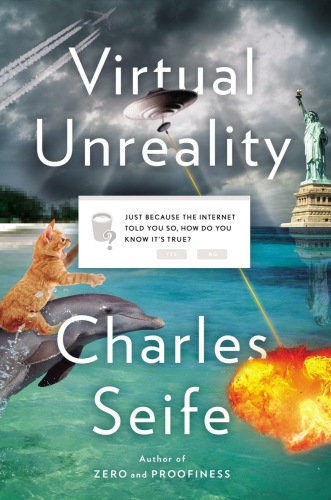
Virtual Unreality
Just Because the Internet Told You, How Do You Know It's True?
کتاب های مرتبط
- اطلاعات
- نقد و بررسی
- دیدگاه کاربران
نقد و بررسی

May 5, 2014
Digital information, according to Seife in this informative book, influences our actions and alters public dialogue in very subtle and devious ways. Seife, a professor of journalism at New York University, defines virtual unreality as the state of “living in a world where the real and virtual are no longer completely disentangled,” as data from the Web affect every one of us in a constant, persistent, and unfiltered manner. He discusses Web schemes that can damage reputations, such as the infamous “sockpuppetry” strategy, using a false identity for deception and gathering information. Seife notes China’s masterful use of sockpuppetry to gather information on rivals, and the New York City police force’s efforts to create false identities on laptops to snare pedophiles and terrorists. Other issues covered are scam emails with bogus names asking for funds, photoshopped images of celebrities, and sinister Wall Street “pump-and-dump” schemes. Intense and incisive, Seife’s exposé of potent tricks on the mesmerizing, overpowering Internet makes us very wary about anything that cannot be verified with our own eyes. Agent, Katinka Matson and John Brockman, Brockman Inc.

Starred review from June 1, 2014
An ingenious overview of a wildly unreliable Internet.Seife (Journalism/New York Univ.; Proofiness: The Dark Arts of Mathematical Deception, 2010, etc.) recounts the story of a Scottish blogger who, frustrated when his opinions on the Middle East were ignored, reinvented himself as a lesbian Syrian activist in war-torn Damascus and became a media star. Constructing an alternative reality once required an entire totalitarian state. Now a single person can do it, as online information moves around the world with the speed of light. It can be stored in virtually no space, copied with perfect fidelity at little cost and altered just as easily. Photoshop has changed the face of fraud. In 1990, image manipulation made up 3 percent of scientific misconduct, but by 2008, it had risen to nearly 70 percent. Most of the trillion emails sent every few days are spam, and most of several hundred million blogs are unreadable. Experts wrote traditional encyclopedias, while Wikipedia is open to anyone regardless of expertise. It's more comprehensive and easier to navigate but nagged by propaganda, vandalism and hoax articles that may persist for years since, in the relentlessly democratic ethos of the Internet, those who detect them have no more authority than the fakers. Intelligent thinking depends on our ability to tell good authorities from bad, writes the author, but the avalanche of free information at our fingertips is marginalizing gatekeepers of the truth (reporters, editors, scholars), who cost money and work slowly. Googling for expertise turns up too many opinionated sources that may not even be human. Seife seeks "not to rail against the Internet, but to act as a guide for the skeptic [with] a handbook for those who wish to understand how digital information is affecting us."Readers of this disturbing but entirely convincing account need to remind themselves that the Internet is pretty useful, but they will not deny that it teems with garbage.
COPYRIGHT(2014) Kirkus Reviews, ALL RIGHTS RESERVED.

























دیدگاه کاربران